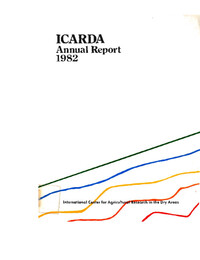ICARDA Annual Report 1982

Authors:
In 1930, French agricultural scientist Depois noted the challenges of agricultural research in rainfed North Africa due to climatic variability, a sentiment reinforced by Holme’s 1961 analysis of Tunisian cereal yields. ICARDA, acknowledging these challenges, has made strides despite political and financial issues, restructuring to improve morale and performance. Key developments include:
A. Integration of training into research programs and the establishment of an independent communications activity.
B. Reorganization of scientific support services within major research programs.
C. A workshop in February with the United Nations University and the University of Aleppo focused on agriculture, food science, and nutrition.
D. A seed production training course in April sponsored by the Netherlands for ten countries to address inadequate seed production.
E. A workshop on faba beans and lentils in May.
F. A financial crisis from March to May necessitated significant adjustments, with conditions improving by late 1982.
G. New potential collaborations with China in faba bean and barley research following staff visits.
H. Preparation for a medium-long term research plan in anticipation of a Quinquennial Review in April 1983.
I. Strengthened cooperation with the Syrian Ministry of Agriculture on collaborative research for cereals, legumes, and forage crops.
